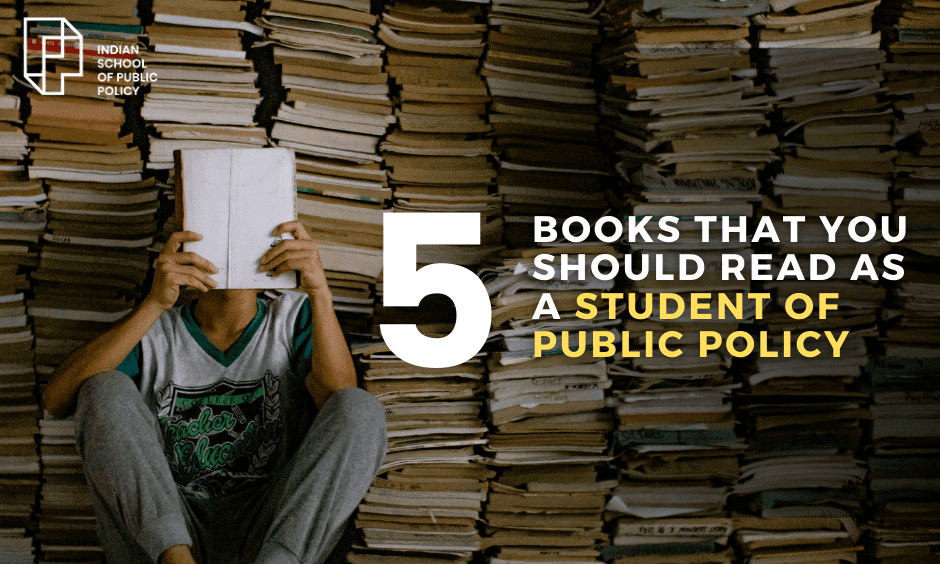
5 Books that you should read as a student of Public Policy

Introduction To Public Policy In India
Public policy is a term used for government decisions and actions that have a direct/ indirect impact on the public. Public policy in India is heavily influenced by International law, the principles of democracy, and social justice.
Public policies are designed to address issues in society, that have been identified in, and by a community or population. The endgame of these public policies is to provide solutions to improve the current situation and the future state of affairs, either for a small population, or at a larger scale.
The importance of designing and implementing sustainable and feasible policy measures has never been more important than now when the world grapples to survive a pandemic. The ability to circumnavigate the barriers to the most viable and realistic policy measures is the key determinant that separates a good policymaker from a regular policymaker. While one would certainly learn about some of these barriers through practice, there is a vast amount of literature that forewarns about them and the erratic and fissile world of policymaking.
To broadly illustrate the main hurdles to optimum policy-making, I am sharing with you the 5 best selling books on Public Policy for beginners, students and even professionals that have greatly benefitted me by expanding the scope of my understanding of issues and making me aware of all the considerations required before even designing a policy.
Summary
Public policy is a term used for government decisions and actions that have a direct/ indirect impact on the public. Public policy in India is heavily influenced by International law, the principles of democracy, and social justice.
Register your Interest to Study at ISPP
What Are The 5 Best Selling Books On Public Policy?
Development as Freedom by Amartya Sen
This ageless classic is the introductory text to policy-making that an aspiring policymaker must feast upon. Beyond introducing the idea that development can be defined in more ways than just in monetary terms, the book strongly backs the argument that development that empowers the individual economically, politically, and socially is wholesome and yet complex to achieve objectives that policies should strive for. In a world with ever-rising support for that oxymoron, ‘authoritarian development, this book is a pertinent call to understanding that development is an exercise in expanding freedoms, and any development that subjugates the people may be growth – but it certainly isn’t development.
Why Nations Fail by Darron Açemoglu and James Robinson
Why Nations Fail introduces the makers of public policy to an obvious but easy-to-miss necessity of good policymaking: the quality of institutions. Açemoglu and Robinson build upon their existing scholarship to argue that the most fundamental building block of economic development, and by extension policymaking, is the quality of the institution under whose auspices policymaking happens. Open and inclusive intuitions (democratic), that allow for many people to participate in them, tend to have better economic outcomes than closed and extractive institutions (authoritarian) where few people have access to decision-making and engage in the exploitation of those who are not part of the inner clique. In the process, the book tries to dismiss a few other theories of development i.e. culture, geography et al. Of course, this does not imply that the book is a self-sufficient explanation of economic development. Readers are cautioned against relying entirely on its explanations as it fails to take into account factors like the role of bureaucratic politics that may affect developmental outcomes. Nonetheless, it is an excellent read that all public policy students, professionals and policymakers must be aware of.
The Anti-Politics Machine by James Ferguson
The Anti-Politics Machine is an excellent complementary read to Why Nations Fail as it investigates the claim that technical solutions (such as policy prescriptions and developmental projects) are, by themselves, a sufficient condition to improve developmental outcomes. Through a study of development projects of the 1970s and 1980s in Lesotho, the book presents a strong hypothesis of how experts often tend to look at developmental problems as technical problems while ignoring the cultural context and the vast gamut of socio-political and economic relations/issues within the local community that underlies the community’s development outcomes. In such cases, the implementation of apolitical solutions, which fail to account for these socio-political and economic realities, tends not only to fail but also have unintended consequences such as expanding the powers of the self-serving bureaucracy through vast resource allocations (read aid) which may never reach the concerned community.
The Essence Of Decision by Graham T. Allison and Philip Zelikow
Albeit written in the context of the Cuban missile crisis and the US response, this book offers key insights into the myriad ways that a bureaucracy operates and tends to shape government decision-making. Given recurring developmental proclamations for institution building and technical solutions, this book refocuses attention on the internal politics that occur within the bureaucracy during the decision-making stage. It analyses how governments arrive at decisions either based on departmental positions and standard operating procedures or through internal negotiations and bargaining between different departments based on policy positions. Overall, the book removes the aura that surrounds policymaking as a technical subject and reduces it to its base element of politics within the bureaucracy.
What the Economy Needs Now edited by Abhijit Banerjee, Gita Gopinath, Raghuram Rajan, and Mihir S. Sharma
Experts can fill the knowledge gap between a bureaucrat’s perception of reality and reality as it exists. In that respect, this book aims to fill the massive hole in the area of policy expertise on contemporary Indian issues of economic importance. It offers concise chapter-wise insights into key policy areas by experts including top academics and government advisors. A key strength and weakness of this book lie in the fact that it does not delve into the nitty-gritty of political and economic considerations required for the implementation of the policies that it prescribes. Thus, this is an excellent beginner’s guide to aspiring policymakers looking for a succinct study of India’s economic woes with an introduction to possible courses of action.
Summary
Here are the 5 best selling books on Public Policy for beginners, students and even professionals that have greatly benefitted people by expanding the scope of their understanding of the issues and designing a policy.
About ISPP
The views expressed in the post are those of the author and in no way reflect those of the Indian School of Public Policy. ISPP was coined as the first school of public policy with a focus on the design and management of institutions, and rules that govern the society. It has been established by a distinguished council of policy experts, administrators and philanthropists and senior academicians with a vision to develop a new class of policy leaders for India through its year-long post-graduate certificate programme in Policy, Design & Management.
FAQs
What is Public Policy?
Public policy is basically a set of laws, guidelines, and actions that need to be taken by governments to work in favor of the public which are usually shaped over numerous years.
What is the importance of public policy?
Public policies usually outlast the governments and politicians long after they’re out of power, hence, it’s important to leverage your vote mindfully so that you support the ones who seek to influence the policies that matter the most.
Why should one study public policy in India?
There is no field with a greater requisite for the spiritual, ethical, and moral paradigm that the enduring philosophy of public policy encourages. The robust character of the professional is primarily what nurtures the next generation of policy leaders, making it one of the main reasons to study public policy in India.
What is the scope of studying public policy?
The students of public policy examine how political procedures create essential programs that work to make a change in the society. These students study areas such as – Human rights, Energy policy, Conflict resolution, Mediation, Poverty, Religion and conflict, Reconciliation and peace-building, International relations and foreign policy, Family services, and Health care.
What are the best books recommended on public policy?
- Development as Freedom by Amartya Sen
- Why Nations Fail by Darron Açemoglu and James Robinson
- The Anti-Politics Machine by James Ferguson
- Essence of Decision by Graham T. Allison and Philip Zelikow
- What the Economy Needs Now edited by Abhijit Banerjee, Gita Gopinath, Raghuram Rajan, and Mihir S. Sharma


